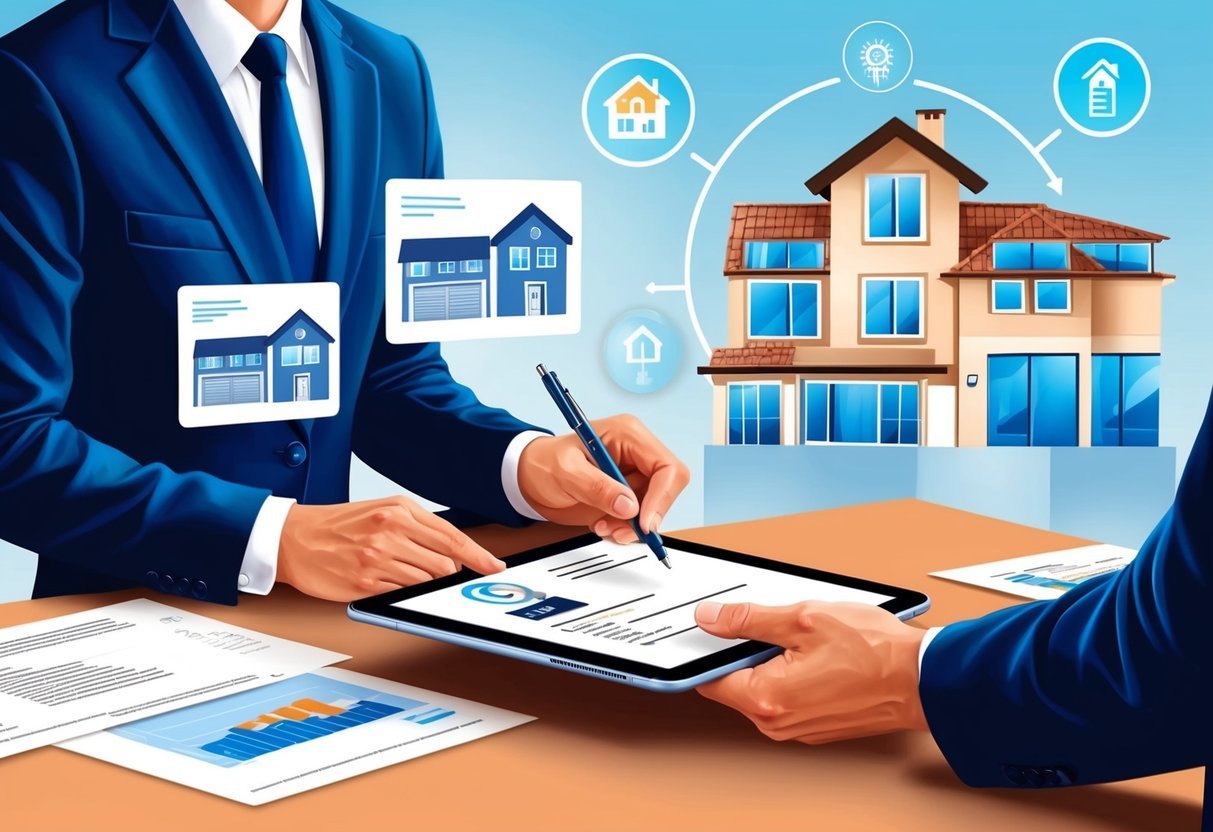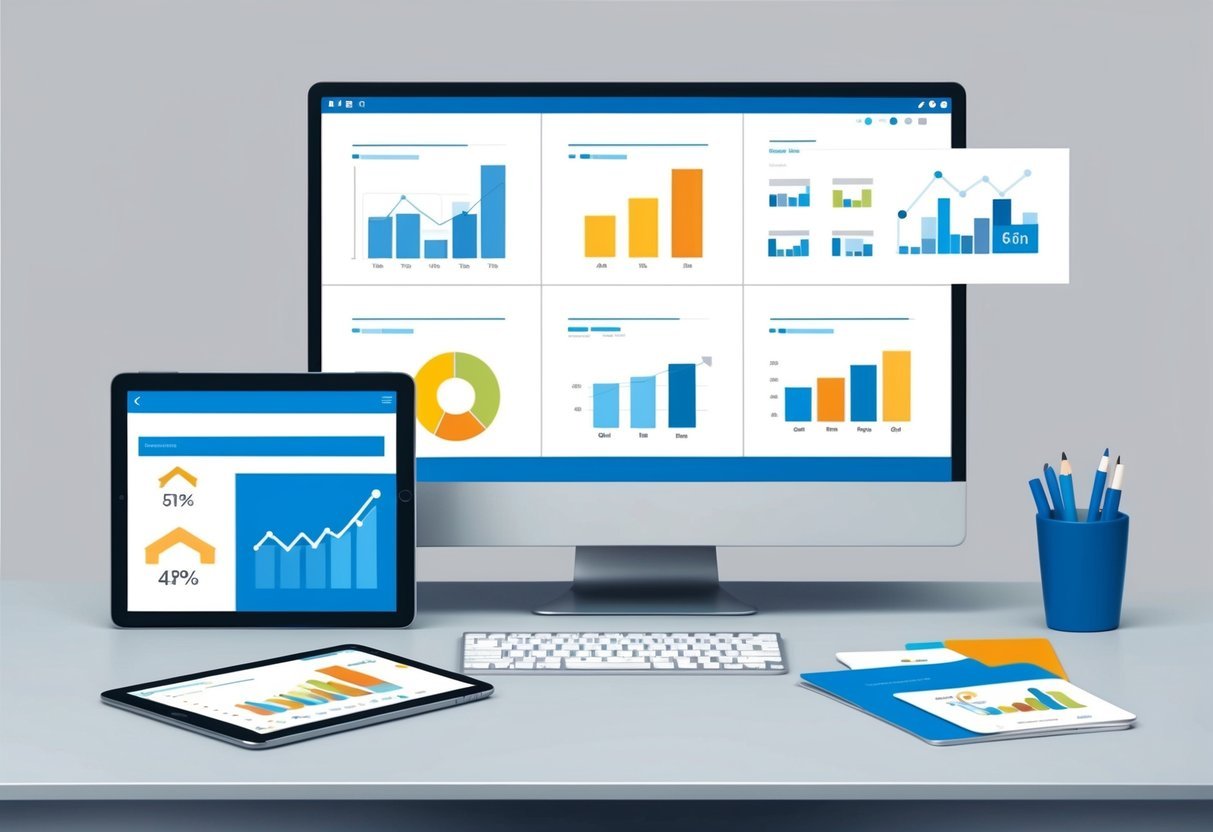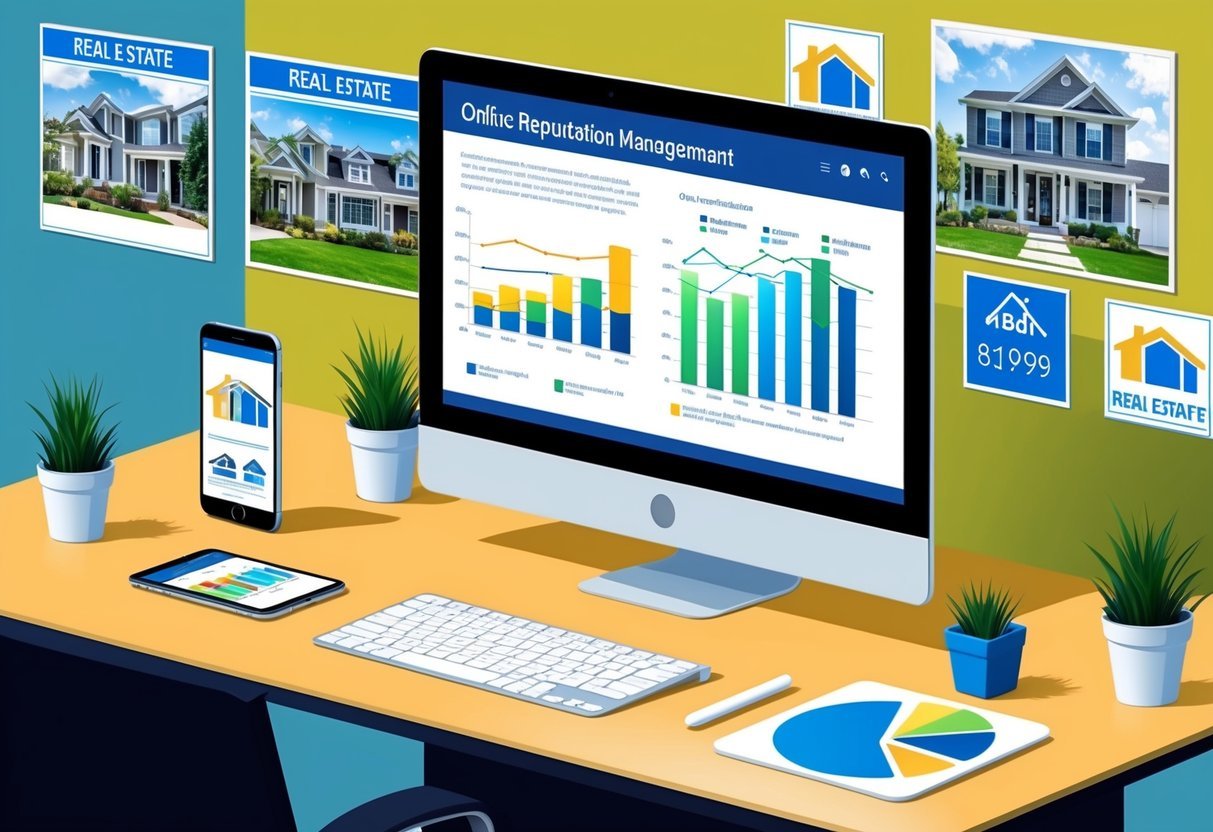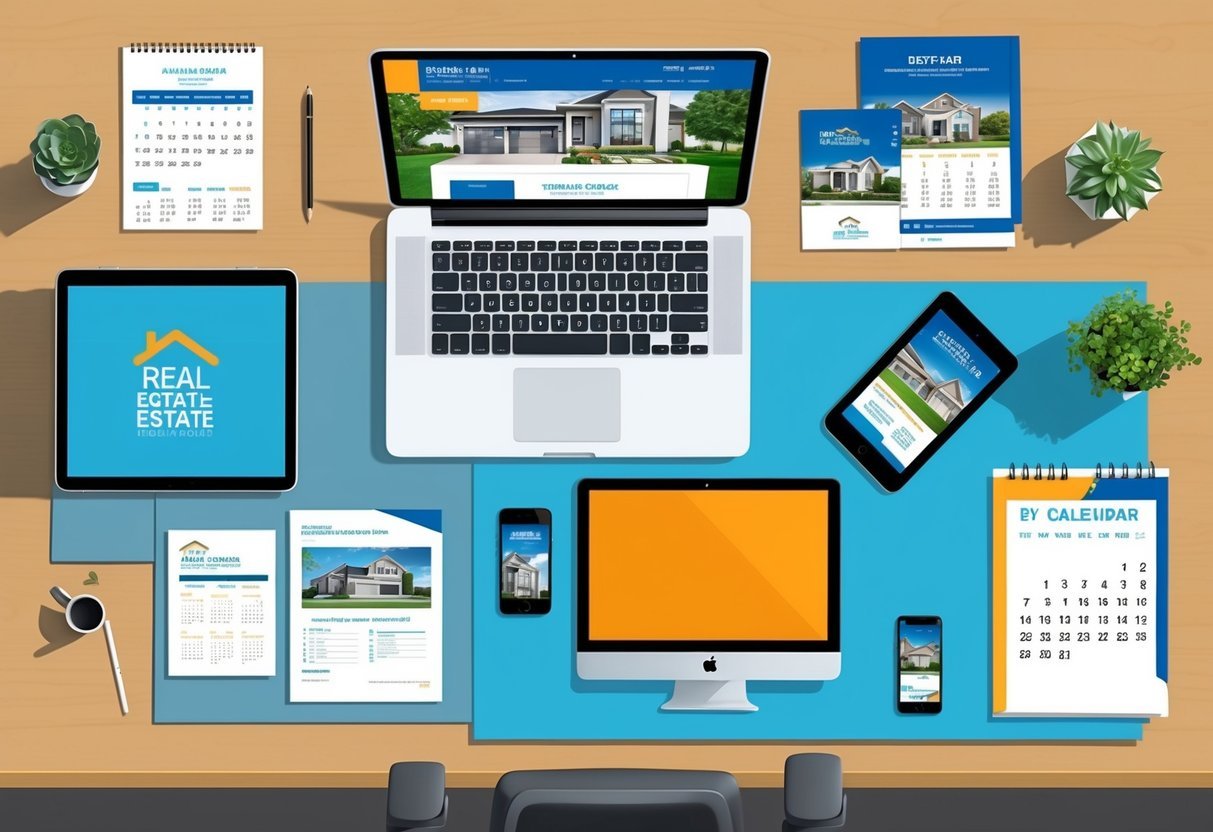Technology is revolutionizing the real estate industry, and we can use it to enhance our services and streamline our processes.
With the increasing demand for efficiency and convenience, we must adapt to new tools and innovations. By adopting cutting-edge technology, we can improve client interactions, optimize business operations, and ultimately achieve greater success.

As we explore various technological advancements, we recognize the potential to transform how we conduct our business.
From virtual reality tours to automated administrative tasks, technology offers numerous opportunities to enhance productivity and client satisfaction.
Our commitment to embracing these strategies will help us deliver superior results and remain at the forefront of the real estate sector.
Virtual Tours
Virtual tours have transformed how we present properties to prospective buyers and renters.
By using 3D modeling and panoramic photography, we can create immersive experiences that allow clients to explore properties from the comfort of their own homes.
This technology enhances buyer engagement and widens our reach to clients who may be in different locations.
Incorporating virtual tours into our listings provides an interactive experience for clients.
They can navigate through rooms, examine the layout, and even get a sense of the property’s space and light.
By offering this detailed preview, we assist in narrowing down the choices, making the decision-making process more efficient.
Utilizing tools like Matterport and 360-degree cameras, we can capture detailed images and convert them into virtual walkthroughs.
Investing in this technology or hiring professionals to create these tours can set our listings apart from the competition.
These tours not only add value to the properties but also save time by reducing the need for physical site visits.
Additionally, virtual tours can be enhanced with virtual reality (VR) to offer an even more immersive experience.
By using VR headsets, our clients can experience properties as though they are physically present, which can be particularly appealing for overseas buyers or those unable to visit in person.
Moreover, virtual tours can be integrated into our marketing strategies, shared easily on social media, websites, and through email campaigns.
This digital engagement can attract a wider audience and boost interest in the properties we represent.
2) AI-Powered Market Analysis
Incorporating AI into market analysis can significantly enhance the real estate process.
By applying AI algorithms to vast datasets, we’re able to extract deeper insights into market trends and shifts.
This technology helps us to anticipate changes and make informed decisions to maximize opportunities.
AI tools assist in evaluating property values with high accuracy, using variables such as location, amenities, and market demand.
This accuracy allows us to make competitive pricing strategies, ensuring our offerings align with current market standards.
Through AI-driven analytics, we gain a better grasp of market demand and customer preferences.
These insights can guide us in tailoring our services and properties to meet specific needs, delivering what clients are truly seeking in the marketplace.
Moreover, AI automates data collection and analysis, saving time and reducing human error.
This efficiency allows us to focus on strategy and provide high-quality service to our clients.
AI can predict future trends by analyzing historical data, offering us a strategic advantage.
This foresight helps us plan our investments and expansions, aligning our strategies with where the market is headed.
Finally, AI-powered tools facilitate a seamless integration of our existing data with real-time market updates.
This dynamic approach keeps us abreast of the latest developments and ensures our strategies are relevant and effective.
3) CRM Software

Customer Relationship Management (CRM) software is an essential tool for any real estate business looking to enhance its client interactions.
By using CRM software, we can efficiently manage leads, track communication easily, and have a clear overview of our relationship with each client.
A well-chosen CRM allows us to organize and access vital information quickly.
This includes contact details, previous interactions, and transaction histories.
With this data at our fingertips, we can personalize our communication, which can lead to stronger client relationships.
Automation features in many CRM systems also help us save time on mundane tasks.
We can schedule follow-up emails, set reminders for important dates, and automate routine reports.
This frees us up to focus on more strategic aspects of our business.
Additionally, integrating CRM software with other tools can streamline our operations.
For instance, linking it to marketing platforms and financial systems improves efficiency.
This helps ensure that all our tools work harmoniously to support our business goals.
Forecasting and analytical features in CRMs provide insights into market trends and client behaviors.
Utilizing these insights helps us make data-driven decisions, enhancing our strategies and improving service offerings.
4) E-signature Solutions

In our real estate business, the adoption of e-signature solutions has transformed the way we handle documents.
By digitizing the signing process, we save time and improve efficiency.
This allows us to focus on serving our clients better and reducing delays in transactions.
E-signature tools offer enhanced security features like encryption and audit trails.
These tools ensure document integrity and compliance, which are crucial in real estate transactions.
Our clients appreciate the added layer of security that e-signatures provide.
Integration with other digital platforms is a key benefit of e-signature solutions.
Many e-signature services seamlessly connect with document management systems and CRMs.
This streamlines workflows and minimizes the chances of errors or misplaced paperwork.
Using e-signatures, we also contribute to reducing our environmental impact.
The reduction in physical paper usage not only saves resources but also reflects our commitment to sustainable practices.
It’s a small yet significant step toward a greener business model.
Our clients enjoy the convenience of completing transactions remotely.
E-signature solutions enable them to sign documents from anywhere, at any time.
This flexibility is particularly valuable for clients who are on the move or reside in different locations.
5) Social Media Marketing Tools

In today’s digital world, having an effective social media presence is essential for real estate professionals.
Our ability to leverage platforms like Facebook, Instagram, and LinkedIn allows us to reach a wider audience and showcase our listings in dynamic ways.
These platforms enable us to connect directly with potential clients and build lasting relationships.
A variety of tools enhance our social media marketing efforts.
Social media management platforms allow us to schedule and track posts efficiently.
This ensures consistent content delivery and optimal engagement times, freeing us to focus on other aspects of our business.
Using AI-powered content generators can be particularly advantageous.
They help create engaging and personalized content, tailored to our unique branding and audience preferences.
By adopting these tools, we stay current with market trends and maintain a competitive edge.
Incorporating video content into our strategies is another critical step.
Platforms like TikTok and YouTube offer us innovative ways to engage with audiences.
Short, visually appealing clips can highlight properties and tell engaging stories about neighborhoods and communities.
We should also employ A/B testing to refine our approach.
By experimenting with different ad copies, images, or videos, we can identify what resonates best with our target audience.
This data-driven method enhances our marketing efficiency and effectiveness.
6) Online Reputation Management

In today’s digital landscape, online reputation management is a crucial component of a successful real estate business.
Our online presence significantly impacts how potential clients perceive our services.
It’s essential to actively manage this perception to maintain a positive image and attract more clients.
We must utilize tools that monitor and manage online reviews.
These tools help us promptly address any issues that arise.
Engaging with feedback, both positive and negative, shows potential clients that we value their opinions and are committed to providing exceptional service.
Requesting reviews from satisfied clients is another effective strategy.
This generates positive content, enhancing our reputation.
We can automate this process using technology, ensuring that requests for reviews are sent consistently and without manual effort.
Having a strategy to respond to negative reviews is just as important.
Addressing these reviews professionally and constructively demonstrates our dedication to resolving client concerns.
This approach helps turn potentially negative perceptions into positive experiences.
Our website and social media platforms are also indispensable tools in reputation management.
We need to regularly update these with fresh content, including client testimonials and success stories.
This helps build trust with potential clients and reinforces our credibility in the marketplace.
7) Property Management Software

Property management software has become an essential tool for us in the real estate business.
It streamlines operations by centralizing key functions such as lease management, accounting, and communication with tenants.
These platforms provide us with data analytics that help make informed decisions.
By tracking various metrics, we can identify trends and anticipate maintenance needs, reducing unexpected costs.
Another advantage is the automation of tasks, which optimizes efficiency.
From sending rent reminders to managing maintenance requests, automation frees us to focus on strategic initiatives rather than administrative work.
Using property management software can enhance tenant satisfaction through transparent communication.
Tenants appreciate easy access to documents and timely updates, which builds trust and improves retention.
Energy optimization is another benefit offered by some advanced systems.
These features allow us to monitor and control energy use, potentially reducing utility expenses and promoting sustainable practices.
8) 3D Property Renderings

In the realm of real estate, visual appeal can significantly enhance a property’s marketability.
We can transform architectural plans into lifelike images that capture the essence and potential of a property before it’s even built by utilizing 3D property renderings.
These renderings allow potential buyers to visualize the space entirely, gaining a better understanding of its layout and design.
3D renderings offer us the ability to showcase properties in various styles and configurations.
This flexibility aids in demonstrating different possibilities to clients, from interior design options to landscaping considerations.
Clients can see the finished look of a property with different furnishings, color schemes, and architectural details, making it easier for them to make decisions.
The immersive nature of 3D visualizations helps in attracting more interest and engagement from potential buyers.
These captivating images can make listings stand out online, providing a competitive edge in today’s crowded real estate market.
When clients feel more connected to a property, it can accelerate the decision-making process and lead to quicker sales.
Additionally, 3D renderings are incredibly useful during marketing campaigns and presentations.
We can provide a more comprehensive view of a property to our clients, enabling them to experience the space in a truly innovative way.
This technology serves as a powerful tool in establishing trust and credibility, as we’re able to present detailed and accurate depictions of our properties.
Finally, we can save time and resources by using 3D renderings to preemptively address client concerns or requests.
By reacting to feedback early in the process, we have the opportunity to make adjustments without the need for costly physical changes.
This proactivity not only enhances customer satisfaction but also streamlines our operations.
9) Automated Email Campaigns

In today’s digital world, automated email campaigns have become a key asset in enhancing our real estate business processes.
By using automation, we can efficiently reach out to potential clients and maintain connections with existing ones, all while saving time.
Automated emails allow us to craft targeted campaigns based on client behavior and preferences.
For real estate, this means sending personalized property recommendations or updates about market trends.
We can also use these campaigns to nurture leads over time.
By maintaining regular contact through useful content, such as tips for homebuyers or insights about local areas, we keep our clients engaged and informed.
Automation software often provides valuable analytics like open rates and click-through rates.
These metrics help us gauge the effectiveness of our communication strategies and make necessary adjustments.
By building and segmenting our email list, we ensure that our messages are relevant to each subscriber.
This personalization fosters trust and loyalty among our clientele.
Furthermore, integrating email campaigns with our CRM enhances our ability to track client interactions comprehensively.
This holistic view aids in delivering a more tailored and satisfactory client experience.
Automated email campaigns also provide an opportunity for us to share testimonials and success stories.
Highlighting past client satisfaction can be a persuasive tool in attracting new business.
Lastly, reminders for events such as open houses or scheduled appointments can be seamlessly automated, ensuring that our clients never miss an opportunity to engage with us.
10) Listing Syndication

Listing syndication is a powerful tool for enhancing the visibility of our real estate listings.
By distributing listings to multiple online platforms simultaneously, we can reach a wider audience without doubling our efforts.
This strategic approach ensures our properties are seen by potential buyers and renters who may not visit our primary site.
Various technology providers assist in this process.
Companies like Point2, RealBird, and vFlyer offer us the capability to automate syndication, making our operations more efficient.
These platforms ensure that our listings are consistent and up-to-date across multiple sites, preventing discrepancies in property information.
Engaging with listing syndication can also improve our SEO strategy.
More exposure on different websites can drive additional traffic back to our primary site.
This increase in visitors can have a positive effect on our site’s search engine ranking, ultimately attracting more clients.
We need to consider carefully which syndication platforms align best with our business model.
Each platform may cater to specific property types or markets, so selecting the right one is vital for maximizing exposure.
Additionally, monitoring the performance of our syndicated listings helps us make informed decisions about which platforms deliver the best return on investment.
Our team must stay informed about the latest tools and technologies in listing syndication.
Continually updating our skills and knowledge allows us to take full advantage of these services.
By leveraging listing syndication effectively, we can position our business to stand out in the competitive real estate market.
11) Online Scheduling
In our fast-paced real estate environment, online scheduling has become an indispensable tool.
With clients expecting quick responses, managing our appointments electronically gives us a competitive edge.
Platforms like Clozio specialize in centralizing tasks, including appointment coordination, which helps keep our schedules organized and efficient.
Our team benefits greatly from tools that sync with major calendar providers like Google, Microsoft, and Apple.
This ensures our schedules are always up-to-date, allowing us to efficiently track meetings and showings.
With pop-up alerts and reminders easily accessible on our devices, we stay on top of every commitment.
Leveraging AI scheduling assistants can further enhance our efficiency.
These intelligent tools automatically find optimal time slots for meetings, making sure no critical appointment is missed.
We save valuable time by allowing technology to manage these mundane tasks, freeing us to focus on more strategic activities.
Additionally, online scheduling platforms often offer customizable booking links that we can share with clients.
This feature streamlines appointment setting by allowing clients to see our availability and schedule meetings without the usual back-and-forth.
Transparency and flexibility like this are crucial in boosting client satisfaction.
Many online scheduling platforms also provide insights and analytics on our time management.
We can review how and where we spend our time, enabling us to make data-driven decisions to enhance productivity.
This visibility helps us prioritize tasks effectively and ensure we maintain a healthy work-life balance.
12) Client Management Apps
In the fast-paced world of real estate, leveraging client management apps is essential for maintaining strong relationships with our clients.
These applications enable us to organize and access detailed client information quickly and effectively.
We can segment our contacts based on various criteria, helping us tailor our communication strategies to different client needs and preferences.
By utilizing these tools, we ensure that no lead falls through the cracks.
We can track interactions and set reminders for follow-ups, keeping us proactive in nurturing client relationships.
Moreover, many client management apps integrate with our calendars and email systems, streamlining our workflow and enhancing productivity.
The visual and user-friendly interfaces of these apps make it easier for us to manage multiple ongoing relationships simultaneously.
They offer at-a-glance insights into our client’s preferences and history, allowing us to provide a personalized experience.
It is crucial for us to select a CRM that seamlessly aligns with our operational needs and business goals.
Furthermore, using client management software with data-driven insights enables us to make informed decisions.
These insights help us identify client trends and preferences, guiding our marketing strategies and business development initiatives.
In the competitive real estate market, staying ahead with accurate client information is a game-changer.
Integrating automation features in these apps reduces manual data entry, freeing up more time for us to focus on building genuine connections with our clients.
We enhance our efficiency while ensuring that our clients feel prioritized and valued.
As a result, client management apps are a crucial part of our toolkit for success in real estate.
Leveraging Digital Marketing
By integrating digital marketing techniques effectively, we can enhance property visibility, attract potential buyers, and strengthen customer engagement.
In this section, we’ll focus on targeted strategies through social media platforms and email marketing that can significantly influence our real estate business success.
Social Media Strategies
Engaging with audiences on social media platforms allows us to showcase properties and interact with potential buyers directly.
Facebook, Instagram, and LinkedIn are powerful tools for reaching diverse demographics, each offering unique features that cater to different marketing needs.
For example, on Instagram, we can use high-quality visuals and stories to provide immersive property tours.
Meanwhile, Facebook’s ad platform enables targeting based on user interests and behaviors, maximizing the reach of our listings to those most likely interested.
Creating engaging content like live events, Q&A sessions, and client testimonials can also build community and trust.
By regularly updating our profiles with valuable content and engaging with our audience, we can position ourselves as authentic and knowledgeable industry experts.
Email Campaigns
Email marketing campaigns provide a direct line of communication with potential buyers and current clients, offering a personalized approach to sharing information.
Segmenting our email lists allows us to tailor messages according to specific needs and preferences, ensuring relevance.
For instance, sending tailored property recommendations or market updates can keep clients informed and engaged.
Utilizing drip campaigns, we maintain consistent communication, gradually guiding prospects through the home-buying journey.
Monitoring open rates and click-through metrics helps us refine our strategy, ensuring maximum impact.
Incorporating visual elements like images and videos within emails can also enhance engagement, offering a more dynamic experience for our clients.
Optimizing Property Listings
In today’s competitive real estate market, leveraging technology is essential for creating appealing property listings.
High-quality images and interactive virtual tours can significantly enhance a property’s appeal and impact prospective buyers’ decision-making processes.
Using High-Quality Images
When capturing property images, our focus is on clarity and detail.
High-quality photos highlight a property’s features, making it inviting for potential buyers.
We ensure photos are well-lit and capture various angles of each room.
Professional photography can make a significant difference.
Hiring a skilled photographer, or using advanced cameras ourselves, helps in creating images that stand out.
We also find that editing tools can enhance these images.
Adjusting the brightness and contrast subtly improves our property’s visual appeal.
Consistency in image style across listings ensures a professional and polished appearance.
Virtual Tours and 3D Walkthroughs
Incorporating virtual tours and 3D walkthroughs provides potential buyers with an immersive property experience.
These tools allow exploration without physical visits, giving a realistic sense of space and layout.
Creating detailed virtual tours involves capturing sequential images or videos, covering significant areas of the property.
We ensure to include key features and unique selling points in these tours.
Utilizing digital technology such as 3D scanners can enhance the overall experience, offering interactive walkthroughs that let users navigate as if they were physically present.
This technology proves invaluable, especially for remote buyers, helping them make informed decisions promptly.
Streamlining Client Management
Incorporating technology into client management can transform our approach to handling client relationships.
Effective use of systems and automation can significantly enhance organization and response times.
Customer Relationship Management (CRM) Systems
A CRM system is crucial in our client management toolkit.
It helps us organize and access client information easily, resulting in better service.
Our CRM can integrate with other tools like Multiple Listing Service (MLS) platforms, ensuring that we have the latest data at our fingertips.
By centralizing client interactions and property details, CRM systems make it simple to track communications and upcoming tasks.
We can set reminders for key actions and never miss an important follow-up.
Furthermore, analytics from CRM data give us insights into client preferences and market trends, allowing us to tailor our services effectively.
Setting up automated reminders and tracking interactions makes it easier for us to provide timely assistance and build stronger client relationships.
When our data is organized and accessible, our efficiency and the quality of service improve significantly.
Automated Follow-Ups
Automating client follow-up emails and messages streamlines our communication process.
Sending timely reminders about property viewings or updates on listings can be managed effectively through automation tools.
By using predefined templates and schedules, we ensure consistent and personalized communication.
These automated messages can be tailored based on client preferences, ensuring relevance and engagement.
Follow-up automation reduces the likelihood of missed opportunities and aids in maintaining client interest.
Using automation ensures that our clients receive information promptly, reflecting our commitment to excellent service.
This setup not only saves time for us but also reassures clients of our proactive approach.
Employing automated follow-up systems contributes to building trust and reliability, key components in successful client relationships.
What are the key technological trends shaping real estate in 2024?
Blockchain, predictive analytics, and virtual tours are prevalent.
IoT sensors enhance property management by improving efficiency and sustainability.
Automated platforms streamline rental processes, delivering convenience for both agents and clients.
How can real estate agents leverage technology to enhance their productivity?
Leveraging AI chatbots allows us to engage with prospects 24/7, managing inquiries and providing information seamlessly.
CRM software helps in tracking client interactions and maintaining strong relationships.
E-signature solutions reduce paperwork and speed up transactions significantly.
What innovative technology solutions are emerging for property management?
IoT devices enable real-time monitoring of properties, optimizing maintenance schedules and energy use.
Digital twin technology fosters collaboration by creating virtual replicas of properties.
These tools elevate management efficiency, while predictive maintenance platforms prevent issues before they arise.
How are modern technologies changing the landscape of real estate development?
3D modeling and virtual reality allow us to visualize properties even before construction begins.
These technologies aid in design adjustments and enhance client collaboration.
Predictive analytics provide deep insights into market demands, leading to more informed development decisions.
What skills should real estate professionals acquire to adeptly handle new technologies?
Proficiency in data analysis tools is essential for extracting valuable market insights.
Familiarity with CRM systems enhances client management.
Basic knowledge of blockchain can prepare us for secure transactions.
What unique ideas are propelling technology-centered real estate startups?
Startups are innovating with platforms that integrate advanced AI for property searches.
These searches are personalized to client preferences.
Virtual reality solutions offer immersive property tours.
Blockchain-based platforms ensure transparent transactions, enhancing trust in property dealings.

